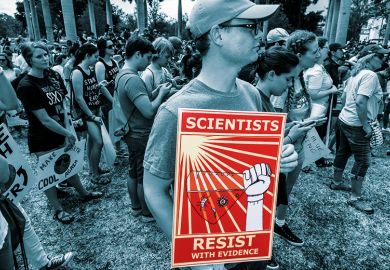Not another Darwin biography," groaned a colleague when I admitted to reviewing this book. And indeed, by my count, this is the fourth to roll off the presses in the past five years. Janet Browne herself confesses that there was a time when she thought her book should be called just that: Darwin: Another Biography. What she now claims to have given us is another Darwin, one not previously revealed by other biographers, the one "his wife or friends might recognise".
The hoary image of the venerable sage of Down House, thinking his revolutionary thoughts in splendid isolation, remote from the social and political concerns of his fellow Victorians, has been disassembled piece by piece like the Berlin wall, and for much the same reasons. Great men and their ideas are now routinely deconstructed and reassembled in sometimes astonishing ways. We now have almost as many Darwins as biographers. The more recent ones, Browne's included, are notably less innocent, more opportunistic, not all that revolutionary, and, in one case at least, Adrian Desmond and James Moore's Darwin (1991), acutely aware of the social and political utility of a theory that made unbridled competition the guarantee of continuous social progress without revolutionary or radical change. Comparisons of Browne's Darwin with the "defiantly social portrait" manufactured by Desmond and Moore are inevitable and instructive, particularly as the latter has received some sharp criticism along with much critical acclaim, while Browne's Voyaging is now being hailed as the "definitive" or "best" Darwin.
If the Desmond and Moore Darwin is overtly political, Browne's is more the domesticated gentleman who cruises along on his wealth, privilege and general good nature. He travels from family to family, from his formative years as the indulged younger son of one of the well-to-do provincial Darwins in a pastoral landscape of landed gentry and wealthy manufacturers, through a succession of familial-like relationships with the radical anatomist and evolutionist Robert Grant at Edinburgh, the paternalistic botanist John Stevens Henslow at Cambridge and the authoritative Captain Fitzroy on board the Beagle, until he marries his well-endowered cousin Emma Wedgwood and achieves his own rural menage at Down House. Then, in a neat inversion of the domestic metaphor that runs through Voyaging, Browne has Darwin turn his house into the Beagle, "a self-contained, self-regulating scientific ship", with the ever-ailing Darwin as cosseted resident naturalist, the ever-solicitous and efficient Emma as Captain, maternal provider of food and comfort, and the numerous servants and children as crew and midshipmen, attentive to his needs and always available to be press-ganged into his scientific inquiries. Even the enormous, far-flung network of scientific informants, breeders, gardeners, naturalists and collectors that Darwin eventually established and maintained with his voluminous correspondence was incorporated into this patriarchal quasi-naval hierarchy. They undertook experiments at his behest, sent him specimens and information, checked references and performed the necessary social functions of a scientist for him while he remained securely ensconced at Down, methodically pursuing his researches and imposing rigid ship's hours on a household organised around his queasy stomach and his work: "The Beagle made him what he was. Nearly 20 years later at Down, he decisively - reassuringly - pulled it back into existence."
Browne's background as editor of the Darwin correspondence has ensured her Darwin is firmly anchored in the letters. His voyaging, even when it takes him to the ends of the earth or into the intricacies of evolutionary speculation, never takes him far from the safety of these primary sources; whereas Desmond and Moore are always ready to push their Darwin beyond them and into engagement with the larger historical events and issues of his time and place. Their respective Cambridge experiences offer a significant instance of the differences between the two Darwins. Where Desmond and Moore make much of the descent on Cambridge of the notorious radicals and freethinkers Richard Carlile and the Revd Robert Taylor, known as "the Devil's Chaplain", their attack on Christian faith and feudal Cambridge, their subsequent expulsion and the long-lasting object lesson of their ostracism and revilement for Darwin who later feared a similar fate for himself if he publicly professed his infidel evolutionary views, Browne tells us firmly that this was not the Cambridge that Darwin knew. This does not mean that she avoids politics, but the politics surrounding her Darwin tend to be more genteel power struggles.
These differing emphases determine the ways in which the pivotal Malthusian insight is handled in the two accounts. Desmond and Moore have Darwin read Malthus and take in the message of the pressures of unchecked population increase and the terrible struggle for existence in a context of Chartist riots, denunciation of the Malthusian-inspired New Poor Law and the workhouses, economic depression and consequent mass emigration rationalised in the cause of imperial expansionism. Darwin's own Beagle-based experiences of colonial extirpation of the "weaker" races predisposes him to see the population crush and resulting conflict as a necessary creative force: "The overcrowding that sent boatloads to the colonies meant that only animals with a competitive edge survived". His biological initiative thus "matches" the "competitive, free-trading ideals" of advanced Whig social thinking, and for Darwin this makes it "compelling". It means that he can superimpose a Malthusian "superstructure" onto the radical base of his evolutionary theory and so dissociate himself from the disreputable Carliles and Taylors who had made evolution synonymous with revolution and godlessness. From the heights of his family class and fortune, Darwin can "thrust a bitter competition on a starving world for its own good". He opts for "Malthusian respectability" and the cultivation of a "better class of audience" for his views among the newly powerful industrialists and reform-oriented professionals.
When Browne's Darwin reads Malthus it is more as the "shrewd economist of the natural world" that his commercial, countrified family background has prepared him to be. Malthus's "inexorable numbers" resolve Darwin's evolutionary questions. For this Darwin, the "balance of nature resembled an account book recording the financial affairs of an entrepreneurial company, with adaptations acting like circulating capital, representing past achievements and the wherewithal for future ventures". His theory therefore dovetails with the "entrepreneurial spirit of unfettered competition" that had established the Darwin and Wedgwood family fortunes and also with the practical commercial acumen of the rural gentry in improving and diversifying domesticated plants and animals. "Natural selection intuitively seemed the right answer to a man thoroughly immersed in the productive, competitive world of early Victorian England." The workhouse, the food riots, the Chartist agitation and colonial expansionism are there, but their harsh Malthusian message is softened and backgrounded to Browne's recurrent emphasis on a more pastoral, family-oriented Darwin, a privileged and demanding one, but for all that, a gentler, less politically aware one. He shrinks from publishing his views not so much from fear of their political repercussions (although Browne has him recoil from the ferocity of anti-evolution opinion when the anonymous evolutionary work Vestiges of the Natural History of Creation is published in 1844) as from a "stronger sense of scientific caution".
Thus Darwin drifts, by degrees, into spending eight long years working on barnacles, just about turning himself into one in the process, to accrue scientific credibility and squeeze out the "facts" that will protect his theory and himself from destructive criticism. His barnacles, he believed, illustrated the gradual evolutionary emergence of separate sexes from an unknown hermaphroditic ancestor, and Browne draws a delightful parallel between Darwin's preoccupation with the evolution of sex and his concurrent concerns about his own role in the domestic and sexual economy of Down House. When, the barnacles at last out of the way, he diverges into more obsessive fact-collecting on pigeon breeding, Darwin, "could not help but anthropomorphise natural selection into a mating ceremony deftly engineered by a wise, all-seeing, and sensible English gentleman". Browne's volume is a "cliff-hanger" that ends in 1856 with a Darwin finally confident enough to write a book he plans to call Natural Selection. His residual faith in a purposeful creator has died with his beloved daughter Anne. The living world is a "financial balance sheet" drawn up to Victorian specifications of entrepreneurial competition and "life itself is chance". Darwin's "ship on the Kentish downs" has avoided the shoals and is ready to run before the wind. The grapeshot of the "striking coincidence" of Alfred Russel Wallace's co-formulation of natural selection is hinted at but yet to be fired across its bows.
It is a big beautiful biography, although irritatingly under-referenced. Too many of Browne's assertions and quotations have to be taken on trust. The more important issue is whether Browne's is the "definitive" Darwin? Browne's is perhaps a better-rounded account than Desmond and Moore's, partly because, by opting for a two-volume biography rather than their birth-to-death blockbuster, she has given herself more leisure in which to develop her story. They are both richly textured portraits, both instances of the "constructivist" turn in the history of science and scientific biography. Browne draws her explanatory metaphors more from the domestic and familial, while Desmond and Moore, although they do not discount the domestic, look more to the political and social for explanation.
I believe there is room for more than one Darwin. Browne's Darwin may well be, as she claims, recognisable to his wife and friends, could we still ask them. But, strictly speaking, that is irrelevant. Like all individuals, Darwin was a man of many faces, and, as Browne acknowledges, he kept much of himself apart from wife and friends. All biographies, like all histories, are partial (in both senses of the word) accounts.
It will be interesting to see how Browne takes up the challenge of the more overtly political Darwin of the Descent of Man, and whether her second volume will appeal so much to those who want to minimise political explanation in theory construction. For there is more here at stake than mere historiography. The Darwinian theory of natural selection remains the central organising principle of modern biology. More than this, many still want to see it as the objective foundation of an evolutionary ethics or a sociobiology. There is, understandably, strong resistance among many of its adherents to historical explanations of natural selection and Darwin's role in its formulation that cast doubt on its political and social neutrality.
Evelleen Richards is associate professor in science and technology studies, University of Wollongong, Australia.
Charles Darwin: Voyaging, Volume One of a Biography
Author - Janet Browne
ISBN - 0 224 04202 5
Publisher - Jonathan Cape
Price - £25.00
Pages - 605



